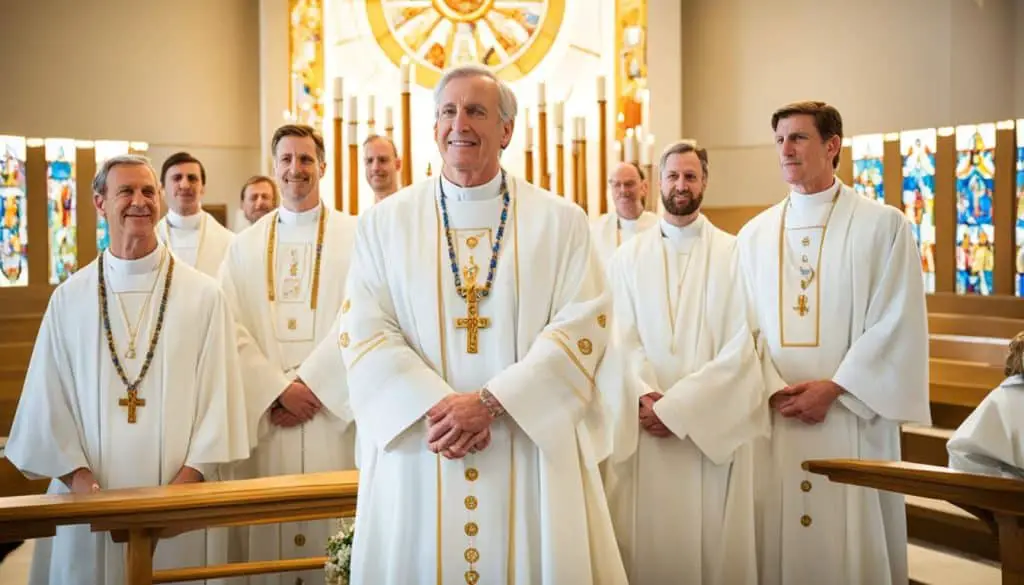Have you ever wondered what holiness truly looks like?
How does the Bible define and demonstrate this powerful concept?
Prepare to dive deep into the sacred texts of the Bible as we uncover remarkable examples of holiness that will challenge your beliefs and inspire your spiritual journey.
From the divine nature of God’s holiness to the commitment of individuals like Daniel and Jesus, we will explore the diverse dimensions of holiness in the biblical narrative.
Join us on this enlightening exploration and discover how holiness is exemplified in various contexts, from personal conduct to sacred spaces, vows, and the work of the Holy Spirit.
Are you ready to unravel the profound significance of holiness in the Bible? Let’s embark on this transformative journey together.
Make Sure You Watch My Video: I would love for you to subscribe to my YouTube channel as well…
God’s Holiness: The Ultimate Standard
God’s holiness is a central theme throughout the Bible, serving as the ultimate standard for moral purity and righteousness. Leviticus 19:2 states, “You shall be holy, for I the Lord your God am holy.” This command emphasizes the divine expectation for God’s people to mirror His inherent holiness in their thoughts, actions, and character.
Isaiah 6:3 further reveals the awe-inspiring nature of God’s holiness. In this passage, the angels proclaim, “Holy, holy, holy is the Lord Almighty; the whole earth is full of his glory.” The repetition of “holy” emphasizes the magnificence and absolute perfection of God’s holiness. It underscores the idea that God’s holiness is not only unique but also all-encompassing.
God’s holiness sets Him apart from everything and everyone. It is the standard by which all morality and righteousness are measured. As believers, we are called to emulate God’s holiness and reflect it in our daily lives.
By recognizing the divine holiness of God and the call to imitate it, we are reminded of the purity and sanctification we are called to pursue. God’s holiness is not just a distant attribute; it is attainable through a close and committed relationship with Him.
| Key Aspects of God’s Holiness | Implications for Believers |
|---|---|
| Perfect and flawless | The pursuit of holiness involves striving for moral purity and integrity in all areas of life. |
| Separate from sin | Believers are called to detach themselves from sinful practices and embrace God’s righteousness. |
| All-encompassing | Holiness is not limited to specific actions or rituals but should permeate every aspect of a believer’s life. |
| Set apart | Living a holy life means being distinct from the values and behaviors of the world. |
Honoring God’s holiness requires intentional efforts to align our thoughts, emotions, and behaviors with the divine standard. It calls for a transformation in our lives as we seek to manifest the goodness, righteousness, and love of God. As we embrace God’s holiness, we experience the transformative power of His presence and grow closer to Him.
The Holiness of the Sabbath: A Day of Rest and Worship
The Sabbath day holds a special place of holiness in the Bible. It is designated as a day of rest and worship, serving as a reminder of God’s creation and his providence in our lives. The significance of honoring the Sabbath is highlighted in Exodus 20:8-11, where it is explicitly commanded:
Remember the Sabbath day, to keep it holy. Six days you shall labor, and do all your work, but the seventh day is a Sabbath to the Lord your God.
On it you shall not do any work, you, or your son, or your daughter, your male servant, or your female servant, or your livestock, or the sojourner who is within your gates.
For in six days the Lord made heaven and earth, the sea, and all that is in them, and rested the seventh day. Therefore the Lord blessed the Sabbath day and made it holy.
This passage affirms the holiness of the Sabbath and the importance of setting aside this day for worship and rest. It serves as a tangible expression of our commitment to holiness, as we honor the Creator and acknowledge his sovereign rule over our lives.

| Key Aspects of the Sabbath | Significance |
|---|---|
| Rest | Reflects God’s rest after creation Provides physical and spiritual rejuvenation Fosters appreciation for God’s provision |
| Worship | A time to gather in community and worship Offers an opportunity for spiritual renewal Expresses gratitude and adoration to God |
| Reflection | Encourages introspection and self-reflection Provides space for spiritual growth and contemplation Promotes alignment with God’s purposes |
The holiness of the Sabbath extends beyond merely refraining from work. It encompasses the intentional cultivation of a sacred time dedicated to God, characterized by rest, worship, and reflection.
“The Sabbath, as a day set apart, consecrated, and hallowed by God, has about it a sanctity, a distinction, and dignity which no other day possesses. It is, therefore, our sacred duty to treat it as holy, and honor it as such.” – Author Unknown
The Holiness of the Tabernacle and Temple
In the Old Testament, the tabernacle and temple held a special place of holiness among God’s people. These sacred spaces were meticulously designed and constructed according to specific instructions outlined in Exodus 25-30 and 1 Kings 6.
The tabernacle, a portable sanctuary, served as a place of worship and pilgrimage during the Israelites’ journey in the wilderness. It was a physical manifestation of God’s presence among his people, emphasizing the importance of holiness in their worship.
The intricate details of its construction, from the Ark of the Covenant to the priestly garments, were meant to reflect the glory and holiness of God.
“And let them make me a sanctuary, that I may dwell in their midst.” – Exodus 25:8
Later, in 1 Kings 6, we see the construction of the temple in Jerusalem under the reign of King Solomon. This permanent structure replaced the tabernacle and became the center of Israel’s worship.
The temple represented God’s dwelling place on earth, a holy sanctuary where sacrifices were offered, and his presence was sought.
Both the tabernacle and the temple were meticulously built and adorned with elaborate furnishings, such as the menorah, the altar, and the veil, all representing the holiness and grandeur of God.
These sacred spaces served as reminders of the Israelites’ covenant relationship with God and their commitment to live in obedience and holiness.
Key Aspects of the Tabernacle and Temple Construction
| Aspect | Tabernacle | Temple |
|---|---|---|
| Purpose | Portable sanctuary during Israelites’ wilderness journey | Permanent dwelling place for God’s presence |
| Construction | Constructed with gold, silver, bronze, fine linen, and acacia wood | Built with cedar wood, stone, and precious metals |
| Furnishings | Ark of the Covenant, menorah, altar, table of showbread | Ark of the Covenant, menorah, altar, basins, and various furnishings |
| Significance | Symbolic representation of God’s presence and holiness | Central place of worship and sacrifice, dwelling place of God |
The Priesthood’s Holiness: Consecrated for Service
In the Bible, Aaron and his sons were chosen and set apart as priests, dedicated to the sacred task of ministering before God. Their role required utmost holiness, as they represented the people before the divine presence.
Exodus 28-29 and Leviticus 8 provide detailed instructions on the rituals and requirements that surrounded the priesthood’s commitment to holiness.
Exodus 28-29 outlines the specific garments and accessories that the priests were to wear, symbolizing their consecration and role as intermediaries between God and the people.
The attire included the ephod, breastplate, and turban, each holding significant symbolism and emphasizing the priests’ dedication to holiness.

Leviticus 8 describes the consecration ceremony wherein Aaron and his sons were anointed with oil and presented before the Lord. This ritual involved sacrifices, purification, and the laying on of hands, signifying the passing of authority and commissioning the priests for their sacred duties.
The meticulous attention to detail in this ceremony demonstrates the weight and significance of the priesthood’s holiness.
“And you shall anoint them just as you anointed their father, that they may minister to Me as priests; for their anointing shall surely be everlasting priesthood throughout their generations.” – Exodus 40:15 NIV
The Priesthood’s Responsibilities
The priests’ duties were multifaceted and included offering sacrifices, teaching the people, and seeking God’s guidance through the Urim and Thummim, a form of divination.
They were entrusted with the care of the holy sanctuary and ensuring that the people followed God’s laws and regulations.
As mediators between God and the Israelites, the priests played a vital role in maintaining the spiritual well-being of the community. Their commitment to holiness was not only a personal matter but also had significant implications for the entire nation’s relationship with God.
| Priesthood Requirements | Responsibilities of the Priests |
|---|---|
| Descendants of Aaron | Offer sacrifices and offerings |
| Purification rituals | Teach the people God’s laws |
| Anointing with oil | Maintain the sanctuary and its articles |
| Wearing specific garments | Interpret and seek guidance through Urim and Thummim |
Focus on providing informative, persuasive, and original content that precisely aligns with the topic and audience, steering clear of generic names or placeholders.
The Nazarite Vow: A Dedication to Holiness
The Nazarite vow, described in Numbers 6:1-21, provides a unique opportunity for individuals to dedicate themselves to God in a special way, symbolizing their commitment to holiness.
Those who choose to undertake the Nazarite vow embrace a set of distinct practices and responsibilities, aiming to live a life of heightened devotion and separation to God.
During the period of the Nazarite vow, participants commit to abstain from certain practices, such as consuming grape products, cutting their hair, and coming into contact with a dead body.
“All the days of their Nazarite vow, no razor shall come upon the head. Until the time is completed for which he separates himself to the Lord, he shall be holy. He shall let the locks of hair on his head grow long.”
The Nazarite vow allows individuals to experience a deeper level of consecration and spirituality as they seek to honor and live in alignment with God’s holy standards.
In addition to their personal commitment, those under the Nazarite vow also serve as a powerful example to others, inspiring greater reverence for God and a renewed desire for holiness within the community.
Key Elements of the Nazarite Vow:
- Abstaining from grape products
- Avoiding contact with the dead
- Not cutting one’s hair
The Nazarite vow reminds us that holiness requires sacrifice and intentionality, calling us to set ourselves apart for the purpose of honoring God and seeking His will in our lives.
The distinct practices and responsibilities of the Nazarite vow serve as a reminder that holiness is not a passive state but an active pursuit, requiring devoted attention and conscious choices that align with God’s character.

| Aspect of the Nazarite Vow | Explanation |
|---|---|
| Abstaining from grape products | This practice signifies the Nazarite’s commitment to refrain from indulging in worldly pleasures, focusing instead on their dedicated service to God. |
| Avoiding contact with the dead | This guideline highlights the separation from impurity and defilement, emphasizing the Nazarite’s commitment to spiritual purity and consecration. |
| Not cutting one’s hair | The growth of long hair symbolizes the Nazarite’s special consecration to God and serves as an outward sign of their commitment to holiness. |
Holiness in Personal Conduct: Reflecting God’s Character
As a believer in the New Testament, living a holy life is not only a calling but also a reflection of God’s character in your behavior.
The Scriptures emphasize the importance of moral purity and the pursuit of holiness in your personal conduct. Let’s explore two key passages that highlight this essential aspect of Christian faith.
1 Peter 1:15-16 – Be Holy in All You Do
In 1 Peter 1:15-16, the apostle Peter reminds believers, “But just as he who called you is holy, so be holy in all you do; for it is written: ‘Be holy, because I am holy.'”
These verses emphasize the significance of imitating God’s holiness in every aspect of our lives. Your thoughts, words, and actions should align with God’s standards, showcasing a life of moral purity and devotion to Him.
“Be holy, because I am holy.”
These powerful words serve as a constant reminder of the divine standard of holiness that believers are called to uphold. Your conduct should reflect the very nature of God, embracing righteousness, integrity, and excellence. By living a holy life, you demonstrate your love for God and your commitment to following His ways.
Ephesians 5:1-3 – Walk in Love and Holiness
In Ephesians 5:1-3, the apostle Paul encourages believers to imitate God and walk in love, stating, “Follow God’s example, therefore, as dearly loved children and walk in the way of love, just as Christ loved us and gave himself up for us as a fragrant offering and sacrifice to God. But among you, there must not be even a hint of sexual immorality, or of any kind of impurity, or of greed, because these are improper for God’s holy people.”
These verses remind us that holiness in personal conduct extends to our relationships and interactions with others. By living a life of love, kindness, and purity, you reflect the selfless and sacrificial love of Christ.
Avoiding any form of immoral behavior or greed demonstrates your dedication to holiness and your desire to honor God in all aspects of your life.
To summarize, as a believer, you are called to live a holy life, modeling God’s character in your personal conduct. Remember the words of 1 Peter 1:15-16 and Ephesians 5:1-3, and strive for moral purity, righteousness, and love in all that you do. By doing so, you honor God and inspire others to pursue holiness in their own lives.

Daniel’s Commitment to Holiness: A Stand in a Foreign Land
In the book of Daniel, we encounter the inspiring story of Daniel and his friends who demonstrate unwavering commitment to holiness, even in a foreign land.
In Daniel 1, we learn how these young Israelites, who were taken captive by King Nebuchadnezzar of Babylon, are faced with a dilemma that puts their commitment to God’s standards to the test.
Their challenge arises when they are offered the king’s food and wine, which would have violated their God-given dietary laws. Despite the allure and pressures of the foreign culture, Daniel and his friends choose not to defile themselves.
“But Daniel resolved not to defile himself with the royal food and wine, and he asked the chief official for permission not to defile himself in this way.” – Daniel 1:8
Instead, they propose a seemingly risky alternative: a diet of vegetables and water. By making this unconventional request, they demonstrate their commitment to God and their pursuit of holiness, even in a hostile environment.
This commitment to holiness sets Daniel and his friends apart, and their faithfulness is rewarded by God’s favor and blessings. At the end of their time of testing, they emerge stronger and healthier than those who consumed the king’s food.
The Lesson in Daniel’s Example
Daniel’s story serves as a powerful reminder of the importance of remaining steadfast in our commitment to holiness, even when faced with challenging circumstances or opposing cultural influences. It encourages us to hold firm to God’s standards and to prioritize our relationship with Him above all else.
Just as Daniel’s commitment to holiness set him apart and brought forth God’s blessings, our dedication to living a holy life can have a profound impact on our relationship with God and those around us.
Emulating Daniel’s example requires courage, resilience, and an unwavering faith in God’s faithfulness. It calls us to resist the allure of compromise and to stand firmly in our convictions, regardless of the prevailing norms.
Striving for Holiness in a Foreign Landscape
Living out our commitment to holiness may not always be easy, especially in a world where values and beliefs may clash with our own. Yet, like Daniel, we are called to be a shining light in the midst of darkness, demonstrating God’s goodness and righteousness through our actions.
In the face of adversity, uncertainty, or cultural pressures, let us draw inspiration from Daniel’s unwavering commitment to holiness. By remaining steadfast in our pursuit of God’s standards, we can experience the transformational power of holiness in our own lives and serve as a beacon of hope and truth to those around us.

Jesus as the Holy One of God: Perfect Holiness Incarnate
Jesus, as depicted in the Gospels, is recognized as the holy one of God, embodying perfect holiness in every aspect of his life and ministry. His divine nature and character are beautifully portrayed in passages such as Mark 1:24, Luke 4:34, and John 6:69.
When confronted by an unclean spirit, Jesus is called the “Holy One of God” in Mark 1:24. This proclamation emphasizes his unique and sacred role as the chosen and anointed one of God, set apart in a divine mission to bring salvation and deliverance to humanity.
“Let us alone! What have we to do with You, Jesus of Nazareth? Did You come to destroy us? I know who You are—the Holy One of God!” – Mark 1:24
In Luke 4:34, Jesus encounters another unclean spirit that acknowledges his holiness and authority. This passage further reinforces Jesus’ divine nature and role as the Holy One who has power over evil forces.
“Let us alone! What have we to do with You, Jesus of Nazareth? Did You come to destroy us? I know who You are—the Holy One of God!” – Luke 4:34
John 6:69 captures the confession of Peter, one of Jesus’ disciples, who acknowledges Jesus as the Holy One of God. This affirmation reflects the disciples’ recognition of Jesus’ unique and sacred identity, as well as their commitment to follow him wholeheartedly.
“Also we have come to believe and know that You are the Christ, the Son of the living God.” – John 6:69
Jesus’ perfect holiness serves as an inspiration and example for believers to strive towards. Through his teachings, miracles, and ultimately, his sacrificial death and resurrection, Jesus demonstrates the depth of divine holiness and its transformative power in our lives.

As we seek to follow Jesus’ example, let us embrace the call to holiness, living lives marked by moral purity, selflessness, and devotion to God. By walking in the footsteps of the Holy One of God, we can experience a profound and intimate relationship with our Heavenly Father and become agents of love, grace, and righteousness in the world.
The Holy Spirit: Guidance and Empowerment for Holiness
The Holy Spirit, often referred to as the third person of the Trinity, has a significant role in guiding and empowering believers to live holy lives. As we embark on our journey towards holiness, the Holy Spirit becomes our constant companion, providing guidance, comfort, and empowerment.
In Romans 1:4, we learn that Jesus was “declared to be the Son of God in power according to the Spirit of holiness by his resurrection from the dead.”
This verse highlights the connection between the Holy Spirit and holiness, emphasizing the Spirit’s role in revealing Jesus’ true identity and empowering believers to live in a manner that reflects holiness.

Ephesians 1:13 further reinforces the significance of the Holy Spirit in our pursuit of holiness. It states, “In him you also, when you heard the word of truth, the gospel of your salvation, and believed in him, were sealed with the promised Holy Spirit.”
This verse reminds us of the Spirit’s indwelling presence within every believer, marking us as God’s children and equipping us to grow in holiness.
“But the Helper, the Holy Spirit, whom the Father will send in my name, he will teach you all things and bring to your remembrance all that I have said to you.” – John 14:26
The Holy Spirit serves as our Helper, working within us to teach, guide, and remind us of Jesus’ teachings. Through the Spirit’s influence, we gain a deeper understanding of God’s Word and are empowered to align our lives with biblical principles of holiness.
Working in Harmony with the Holy Spirit
To fully experience the guidance and empowerment of the Holy Spirit, it is essential that we cooperate and collaborate with Him. Here are a few practical ways to work in harmony with the Holy Spirit:
- Seeking God’s Presence: Set aside time for prayer, worship, and meditation, inviting the Holy Spirit to dwell within you and lead your thoughts and actions.
- Studying God’s Word: Engage in regular Bible study, allowing the Holy Spirit to illuminate the Scriptures and reveal divine truths for your life.
- Listening and Obeying: Cultivate a sensitive heart to the Holy Spirit’s promptings, listening attentively and obeying His guidance in all areas of life.
- Practicing Discernment: Develop discernment through the Holy Spirit’s guidance, enabling you to distinguish between godly and ungodly influences and make decisions that align with holiness.
By actively partnering with the Holy Spirit, we invite His transformative power to work in our lives, enabling us to walk in the path of holiness and experience the fullness of God’s presence.
How Do Examples of Biblical Submission Connect to Holiness in the Bible?
The concept of holiness in the Bible is closely tied to biblical submission. In Ephesians 5:22-24, wives are called to submit to their husbands as to the Lord. This is one of the 10 biblical submission examples that illustrate how submission is linked to holiness in the Bible.
The Call to be Holy: Moral Purity and Dedication to God
Both the Old and New Testaments emphasize the call for God’s people to be holy, just as He is holy. Leviticus 11:44-45 states, “For I am the Lord your God. You are to consecrate yourselves and be holy because I am holy.” It is a divine command to pursue moral purity and dedicate ourselves fully to God’s will.
As believers, we are called to reflect the sacredness of our relationship with God through a dedicated pursuit of holiness. In 1 Thessalonians 4:7, we are urged to live lives that are “not governed by passionate lust” but instead characterized by self-control and moral integrity.
This call to holiness extends to every aspect of our lives – our thoughts, words, actions, and relationships.
To be holy means to be set apart, distinct from the ways of the world, and aligned with God’s character. It involves choosing righteousness over sin, love over hate, and humility over pride. Our pursuit of holiness is not a mere legalistic obligation but a response to the grace and love of God poured out on us.
Ultimately, holiness is a lifelong journey, an ongoing process that requires surrender, discipline, and reliance on the Holy Spirit. It is through our obedience to God’s command to be holy that we reflect His love and light to the world and draw others to Him.
As we strive for moral purity and dedicate ourselves wholeheartedly to God, we become living testimonies of His transformative power in our lives.
Call to Action: The Question That Demands an AnswerIn Acts 2:37 Peter and the Apostles were asked the question – What Shall We do? And in Acts 2:38 Peter answered, Repent, and be baptized every one of you in the name of Jesus Christ for the remission of sins, and ye shall receive the gift of the Holy Ghost. For the promise is unto you, and to your children, and to all that are afar off, even as many as the Lord our God shall call. Do you understand this? After hearing the gospel and believing, they asked what should would do. The answer hasn’t changed friend, Peter clearly gave the answer. The question for you today is, Have you receieved the Holy Spirit Since you believed? If you’re ready to take that step, or you want to learn more about what it means to be born again of water and Spirit, visit: Come, and let the Spirit make you new. |





